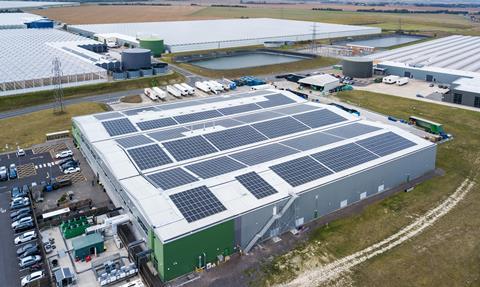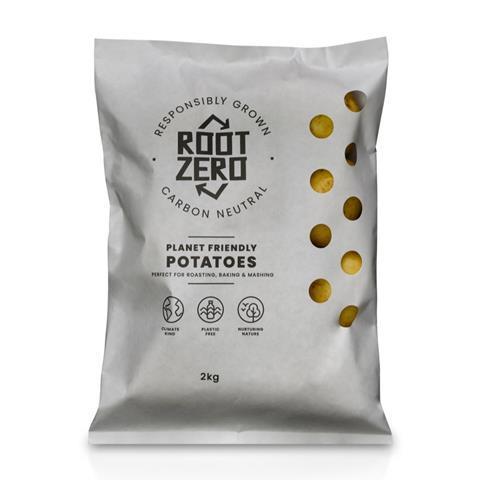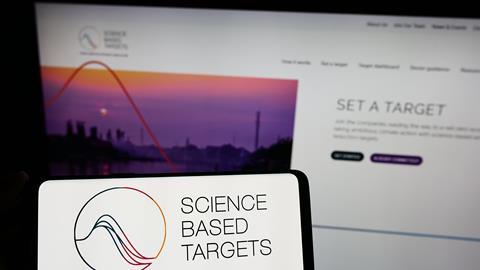More and more fresh produce companies are turning to science-based SBTi targets as they plot their paths to net zero. Two major UK growers share their experiences of the journey
Adam Harrison, environmental and sustainability technologist at Thanet Earth, and Matthew Thomas, head of sales and marketing at Puffin Produce, discuss their companies’ experiences, goals and challenges as they continue on their SBTi journeys.
What made you decide to aim towards achieving SBTi targets?
Adam Harrison (AH): At Thanet Earth we recognise the critical role which our industry plays in shaping a sustainable future, so felt it necessary to introduce the structure of SBTI to our development plan. By aiming toward SBTI it has allowed us to demonstrate sustainable agriculture. By committing to SBTI we have been able to align our operations with a globally recognised climate science. Regulatory landscape is constantly evolving and there is increasing pressure being put on businesses to reduce emissions and adopt sustainable practices. By aligning with the forward-thinking SBTI approach it ensures that as a business we stay ahead of the curve. The business has a desire to make a meaningful difference – through setting and achieving SBTI targets it is a tangible way for us to make a positive impact and fulfil our business responsibility towards the environment.
Matthew Thomas (MT): The Puffin business has always been forward thinking in the way it does business, and ESG has been at the heart of its company-wide strategy with food security becoming an increasingly important consideration, with the effects of climate change and how it therefore affects crops. Through years of its own work on and off farm, the business decided to set something tangible as a means of reporting, and in 2019 we started our SBTi journey.
When did you decide to do it, and can you explain a bit more about what you are specifically working towards?
MT: In 2019, we started our SBTi journey and committed to reduce our emissions by 46 per cent by 2030, and more recently our net-zero target to reduce at least 90 per cent of all scope 1 to 3 emissions by 2040, with any residual emissions neutralised with verified insets on farm. Agriculture has a significant impact on people, our landscapes, biodiversity and climate. It is our mission to have a net-positive impact, by working closely with our growers and supply chain partners, embracing new technology and old wisdom. We are committed to reduce our greenhouse emissions ahead of national targets by improving the land that we work on, restoring nature and giving back to the community. Like all businesses we are vulnerable to the risks that climate change amplifies. Our supply chain must be resilient to more frequent droughts, higher temperatures and heavier rainfall than generations of potato growers before us. We are collaborating with other local businesses to ensure that our approach to sustainability works at a regional level, and we intend to share best practice to accelerate national progress.
AH: We set our target in 2021 and have used this as our base year for emissions. Our specific target is to reduce our scope 1 and scope 2 emissions by 42 per cent by 2030.

How big a culture change has that required within the business?
AH: The business has always understood its environmental impact and was designed in an environmentally conscious way to minimise impact from the offset. However, as time has progressed, and more stringent requirements have been introduced both from government legislation and customers, there has had to be a level of focus and adaptability to assist in driving emissions reduction that was not originally in place.
MT: The business from top down has always been at the forefront of sustainable change, and there is no end to this. In recruitment and training, we make sure that this is embedded throughout. We want like-minded people driving the business forward.
What changes or investments have you made to work towards that?
MT: Roughly five years ago we installed a water treatment plant to manage our water usage on site, with a high percentage of our water use being recycled. In 2022 we commissioned our solar project, which running at peak output, the company expects to generate 2 MWh – enough to power its entire production and storage operations from the solar installation and saving an estimated 2.4t of Co2e per day (based on a usage of 10,000 kWh per day). That means Puffin will be able to offset most of their 3,780,000-kWh full-year usage through self-generated electricity, enabling it to hit its 46 per cent emissions reduction target ahead of the 2030 target. All our farms now meet the LEAF Marque standard – a great step towards nature-friendly farming. But we want to do better than that, so we have developed our own Puffin Carbon Plus Grower Scheme to be implemented in 2024. The scheme is a staged approach to transitioning our growers’ farms to more sustainable practices. The scheme will reward growers through payment for actions that reduce emissions and store carbon. Associated benefits of actions in the scheme will include reduced costs for our growers, improved water quality, better soil health and more wildlife on our farms. Some of our farmers are already trailblazing these regenerative practices.
AH: The business has invested in several technologies to successfully reduce its impact. A few notable mentions include the introduction of solar panels on the packhouse roof in 2023. All on-site vehicles run off HVO fuel which has a significantly lower emission impact in comparison to diesel. When looking to the glasshouses, there has been significant investment in LED lights to aid the growing process, moving away from sodium.

What are the biggest challenges in picking the SBTi route? What have you learnt on your journey so far, positive or negative?
AH: One of the significant challenges we have faced in pursuing SBTi targets is the requirement for sustained focus and substantial investment. Achieving meaningful reductions in emissions is not an overnight task; it requires a long-term commitment and a comprehensive approach that touches every aspect of our operations. Integrating sustainability into the core of our business involves making numerous operational changes. These changes must become ingrained in our daily routines and processes, requiring us to rethink how we manage resources. This transformation demands a shift in practices but also alignment with our long-term strategic vision. The financial investment needed to implement sustainable practices can be considerable. From upgrading equipment and adopting new technologies to training employees.
MT: The process was straightforward, but took time to finalise. Since then it has been seamless, with the intent to report through our company impact report.
Have you set other sustainability targets?
MT: SBTi to reduce scope 1 & 2 emissions by 46% by 2030; Net zero – reduce all emissions by at least 90 per cent by 2040; Water Roadmap; Courtauld commitment – reduce food waste by 50 per cent by 2030.
AH: We are aligned with the WRAP Food Waste Reduction Roadmap to reduce food waste by 50 per cent by 2030. Also, we have recently committed to the WRAP Water Roadmap, in conjunction with the Fresca Group. Looking further afield, we have set an internal target surrounding measuring scope 3 emissions.
For a full feature on SBTi, see Saving the Planet Through Science, coming soon in FPJ’s Sustainability Special, out late August 2024




